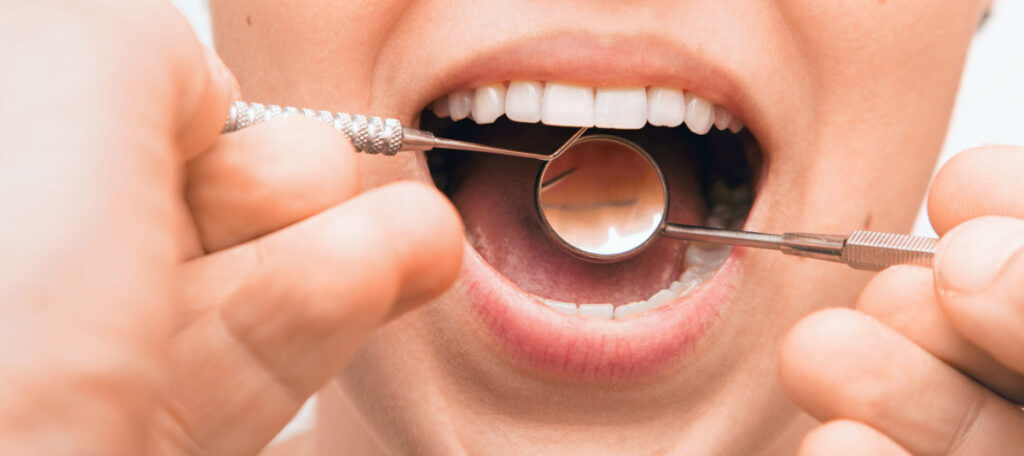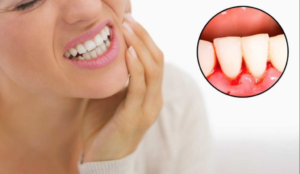The simple answer is no, but they are common. Up to 33% of adults aged 25-54 in the UK report having bleeding gums.
If your gums bleed when you are brushing, flossing, or even just while eating, it could be a sign that something more serious is brewing in your mouth. It’s your body’s way of indicating that your oral health needs attention. The good news is that most of the time, it’s preventable and treatable with the right care.
Let’s take a closer look at why your gums might bleed, what it means for your overall health, and what steps you can take to fix it.
It All Starts With Plaque
Essentially, gums bleed when they are inflamed, and that is (apart from a few unusual conditions and, arguably, pregnancy) almost always due to the bacteria in plaque. Plaque starts to build up again almost immediately after you have cleaned your teeth, and as it becomes stickier and more filled with bacteria, it causes more problems with different, more unpleasant bacteria taking hold.
This is why it’s important to clean your teeth twice a day.
It’s also important to clean between them where the brush doesn’t reach. Just because it isn’t easy for us to get there, it doesn’t mean it’s difficult for bacteria or even food debris.
Then The Gums Start to Bleed
The early stage where the inflammation is confined to the collar of gum that is immediately around the tooth is called gingivitis. If it’s caught early enough, it is reversible with proper dental care.
But if gingivitis is left untreated, the inflamed collar of gum loosens and bacteria can get further down around the tooth. This is periodontitis, and it will lead to bone loss and, most probably, tooth loss if it is not managed with professional treatment. It is much harder to stop periodontitis, which is why it’s important to address bleeding gums early on.
Factors That Can Cause Gums to Bleed More Easily
- Stress: Chronic stress can weaken your immune system, making it harder for your body to fight infections, including in your gums.
- Medications: Certain medications, like blood thinners, can increase the likelihood of gum bleeding.
- Poor diet: A diet lacking in essential vitamins like vitamin C can weaken the tissues in your gums.
- Hormonal changes: Pregnancy, menopause, or other hormonal shifts can make your gums more sensitive.
- Tobacco use: Smoking or using tobacco products can increase your risk of gum disease and make it harder for your gums to heal.
If you’ve noticed that your gums bleed when you brush or floss, don’t ignore it. It’s important to take action before it gets worse.

Bleeding Gums Aren’t Just a Mouth Problem
Research is being conducted all the time into gum disease because it is the easiest way for bacteria to get into your bloodstream, and this can affect your overall health. Untreated periodontitis has been scientifically linked with:
- Heart disease: Chronic gum infections have been shown to increase inflammation in the body, which may raise your risk of heart disease.
- Diabetes: Gum disease can make it harder for your body to control blood sugar levels, and those with diabetes are more likely to develop gum disease.
- Premature birth and low birth-weight babies
- Stroke
- Pancreatic cancer
Taking care of your gums is an important part of taking care of your overall health.
The Risks of Ignoring Bleeding Gums
Many people assume that a little bleeding from the gums is normal, especially if it happens just once in a while. But that can lead to bigger problems further down the road.
Ignoring gum disease can lead to:
- Tooth loss: As gum disease progresses, it can lead to severe damage to the bone that supports your teeth. This can cause your teeth to loosen and even fall out.
- Increased dental costs: The longer you wait to address bleeding gums, the more costly and intensive the treatment will be. What could have been a simple cleaning or a round of antibiotics may turn into a more involved procedure, like scaling and root planing or gum surgery.
- Chronic bad breath: Gum disease often causes persistent bad breath, which can affect your confidence and social interactions.
Don’t wait until things get out of hand. Addressing bleeding gums early can prevent these long-term consequences.
What Can You Do About Bleeding Gums?
If you’re dealing with bleeding gums, don’t panic. There are a few simple steps you can take to improve your gum health and stop the bleeding.
1. Improve Your Oral Hygiene
Those bad bacteria found in dental plaque can’t cause problems if they are disturbed twice a day with proper cleaning. Brush carefully, making sure to clean the gum line as well as your teeth, and clean carefully between the teeth.
2. Choose the Right Products
Consider using an electric toothbrush, which can remove plaque more effectively. You could also try an antimicrobial mouthwash to help reduce bacteria in your mouth.
3. Eat a Nutritious Diet
A diet rich in fruits, vegetables, and lean proteins can support gum health. In particular, vitamin C is essential for healthy gums, so include foods like oranges, strawberries, and leafy greens.
4. Don’t Smoke
If you smoke, quitting can dramatically improve your gum health. Smoking damages gum tissue and makes it harder for your gums to heal from infections.
5. Schedule Regular Dental Check-ups
Visiting your dentist regularly is the best way to prevent and treat gum disease. Professional cleanings can remove plaque and tartar that build up over time, and your dentist can catch any problems early before they become more serious.
When Should You See a Dentist?
If your gums continue to bleed for two weeks or longer, even after improving your oral hygiene, it’s time to see a dentist. Additionally, if you notice any of the following, don’t wait:
- Gums that are swollen, red, or tender
- Gums that pull away from your teeth
- Persistent bad breath
- Changes in the way your teeth fit together
These could all be signs that gum disease has progressed and that you need professional treatment.
Conclusion
Bleeding gums are not something to ignore. While they’re a common issue, they are also a sign that your oral health needs attention. By taking the right steps now, you can protect your teeth, prevent gum disease, and improve your overall health.
Remember, good oral hygiene is a lifelong commitment—and the benefits go far beyond a healthy smile. If you’re noticing any signs of bleeding gums, don’t wait. Schedule a dental check-up and start taking better care of your gums today. Your mouth (and your body) will thank you.
You could watch this video on what can happen if you develop periodontitis and how to cure it.




